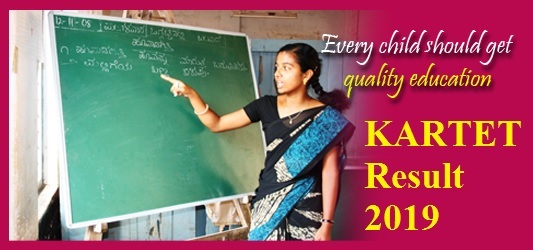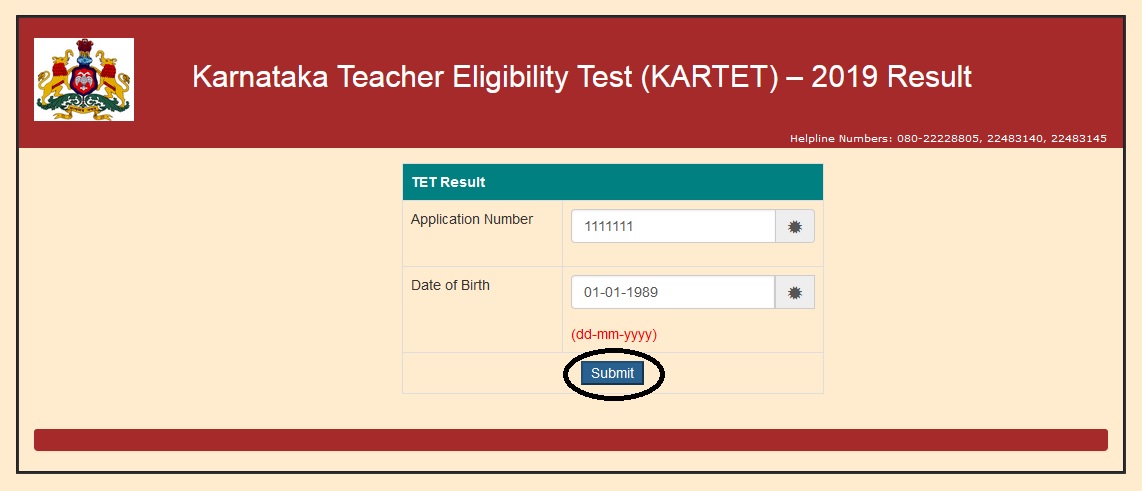KARTET Result 2019 Teacher Eligibility Test : sts.karnataka.gov.in
Organisation : Karnataka Commissioner of Public Education Department
Exam Name : Karnataka Teacher Eligibility Test (KARTET) 2019
Announcement : Result Declared 2020
Exam Date : 4th October 2020
Website : http://schooleducation.kar.nic.in/
| Want to comment on this post? Go to bottom of this page. |
|---|
Contents
KARTET Result
Result of Karnataka Teacher Eligibility Test (KARTET) 2019 has announced.
Related / Similar Result : KEA UG NEET 2020 First Round Allotment Result

How To Check Result?
Just follow the simple steps mentioned below to know the result of KARTET 2019
Steps:
Step-1 : Go to the link https://sts.karnataka.gov.in/TET/
Step-2 : Enter the Application Number
Step-3 : Enter the Date of Birth and
Step-4 : Submit the button

Exam Pattern
** The KARTET Paper I is for candidates who want to teach classes 1 to 5
** The KARTET Paper II is for candidates who want to teach classes 6 to 8
** There is no negative marking
** 150 Multiple Choice Questions (MCQs) will be asked in both papers
** Each question is of 1 mark
Paper I :
| Subject | Number of MCQs | Marks |
| Child Development and Pedagogy | 30 | 30 |
| Language I | 30 | 30 |
| Language II | 30 | 30 |
| Mathematics | 30 | 30 |
| Environmental Studies | 30 | 30 |
| Total | 150 | 150 |
Paper II:
| Subject | Number of MCQs | Marks |
| Child Development and Pedagogy | 30 | 30 |
| Language I | 30 | 30 |
| Language II | 30 | 30 |
| Mathematics and Science
(for Mathematics and Science teacher) OR Social Studies/Social Science (for Social Studies/Social Science teacher) |
60 | 60 |
| Total | 150 | 150 |
Syllabus
Child Development :
Concept of development and its relationship with learning, Principles of the development of children, Influence of Heredity & Environment.
Socialization Processes:
Social world & children (Teacher, Parents, Peers)
Concepts of child-centered and progressive education:
Piaget, Kohlberg and Vygotsky, constructs and critical perspectives., Critical perspective of the construct of Intelligence, Multi Dimensional Intelligence, Language & Thought.
Gender as a social construct: gender roles, gender-bias and educational practice, Individual differences among learners, understanding differences based on diversity of language, caste, gender, community, religion etc.,
Distinction between Assessment for learning and assessment of learning:
School-Based Assessment, Continuous & Comprehensive Evaluation., perspective and practice, Formulating appropriate questions for assessing readiness levels of learners, for enhancing learning and critical thinking in the classroom and for assessing learner achievement.
Concept of Inclusive education and understanding children with special needs:
Addressing learners from diverse backgrounds including disadvantaged and deprived addressing the needs of children with learning difficulties, ‘impairment’ etc., addressing the Talented, Creative, Specially abled Learners Learning and Pedagogy: How children think and learn; how and why children ‘fail’ to achieve success in school performance.
Basic processes of teaching and learning:
Children’s strategies of learning, learning as a social activity and social context of learning, Child as a problem solver and a ‘scientific investigator’.
Alternative conceptions of learning in children :
Understanding children’s ‘errors’ as significant steps in the learning process. Cognition & Emotions, Motivation and learning, Factors contributing to learning – personal & environmental
Helpline Numbers
080-22228805, 22483140, 22483145